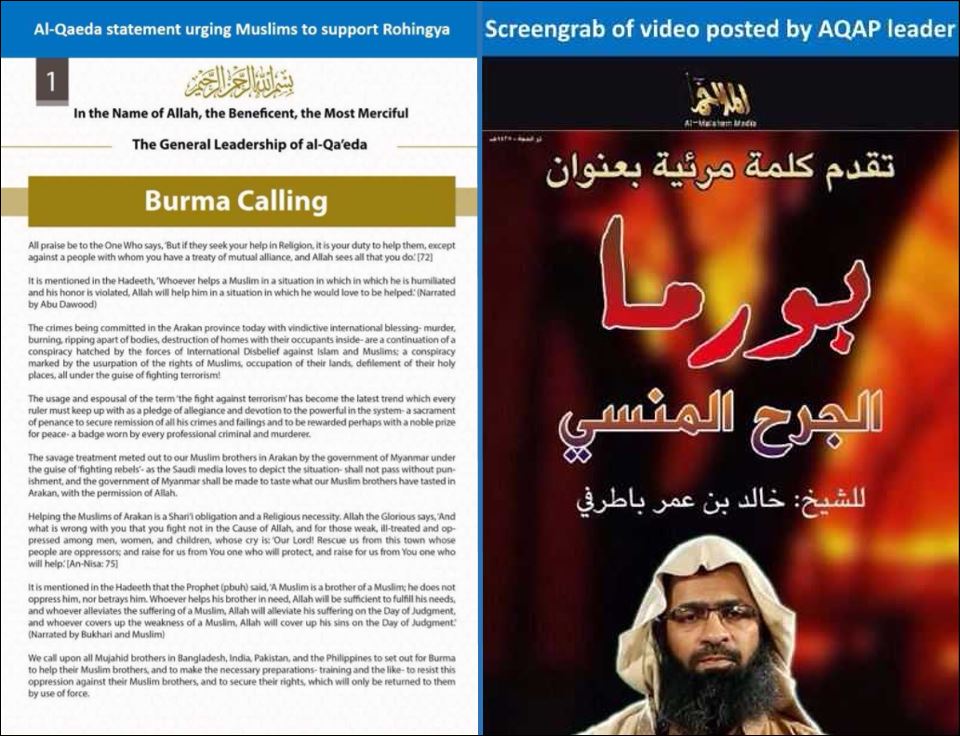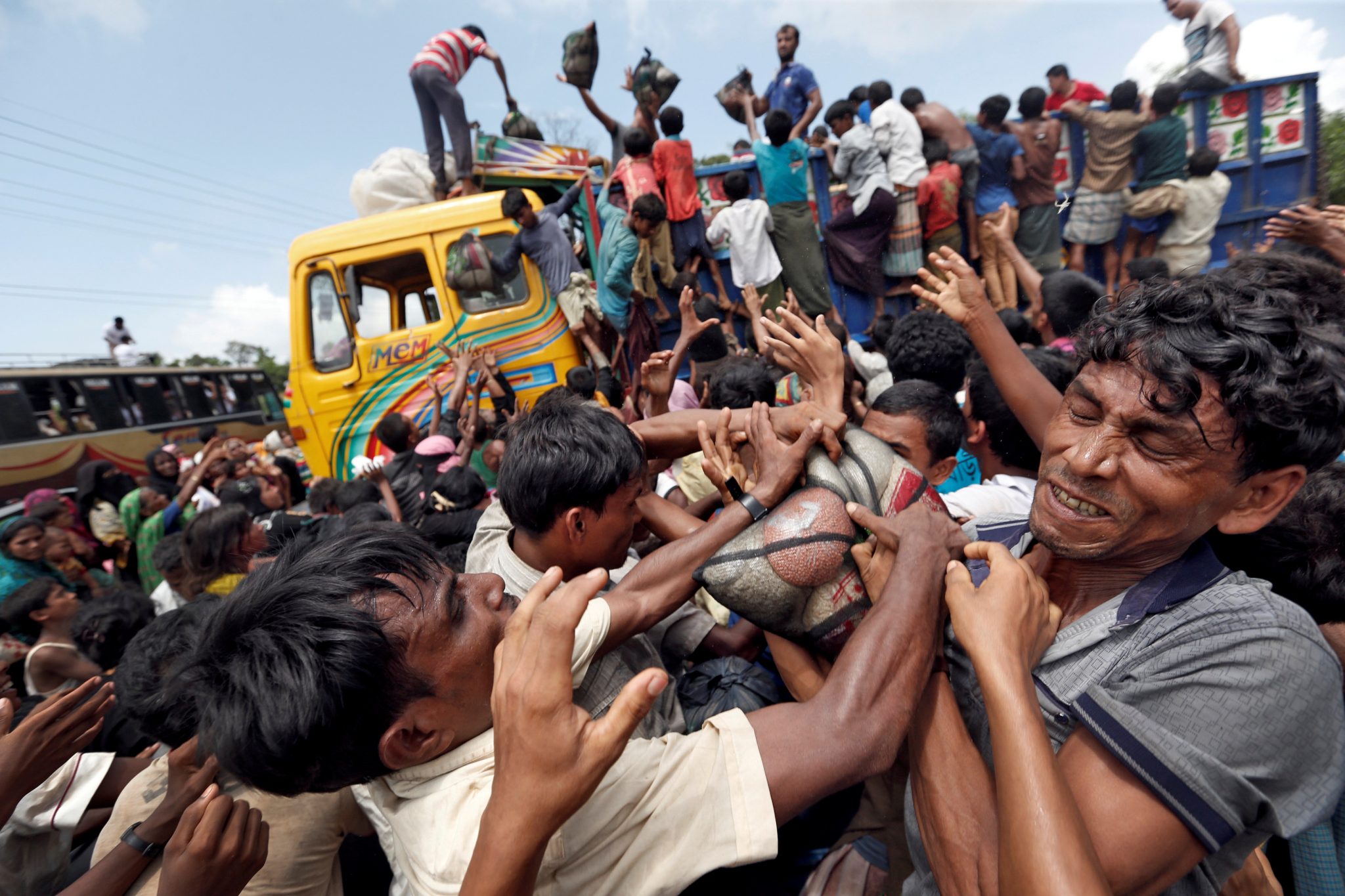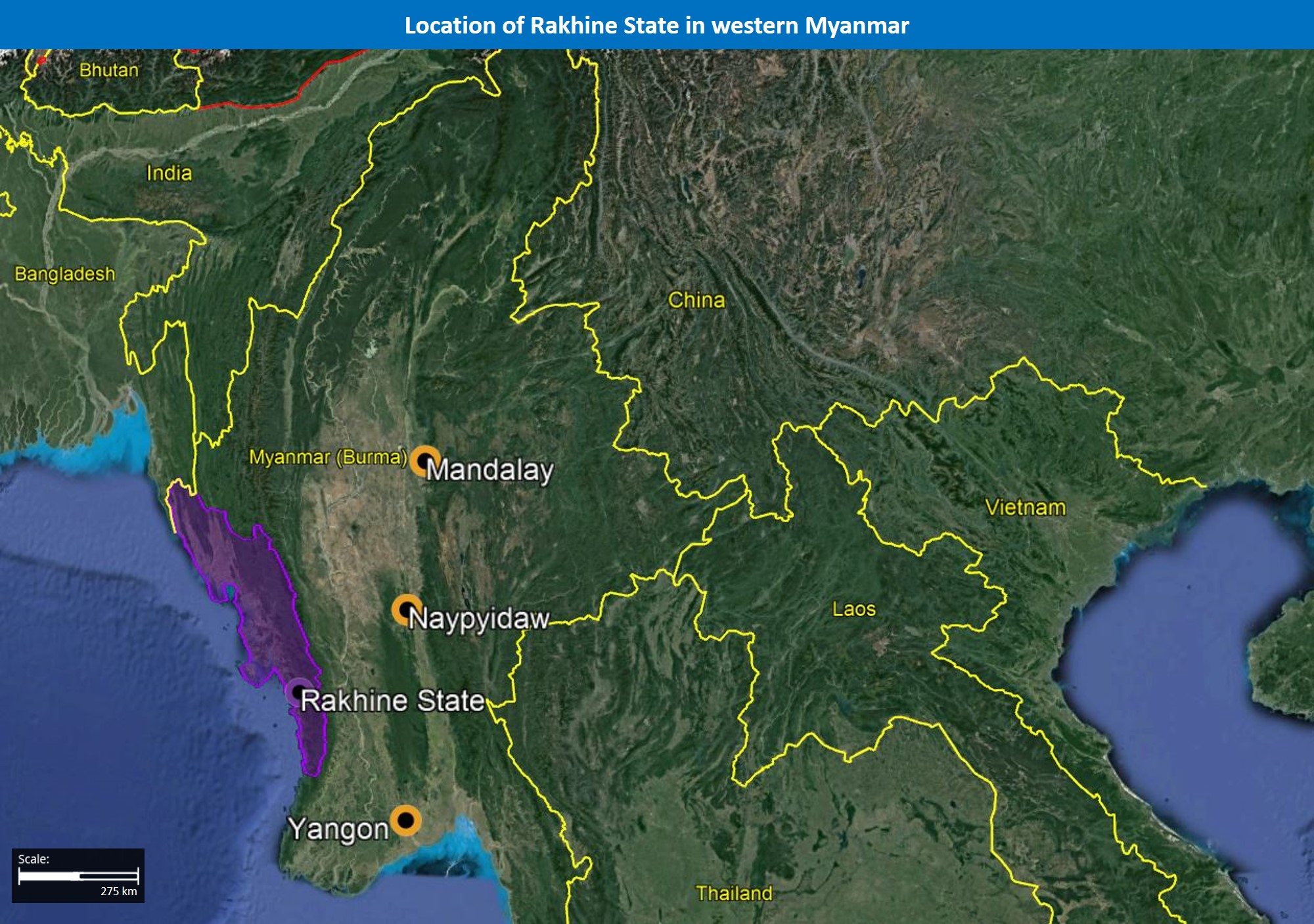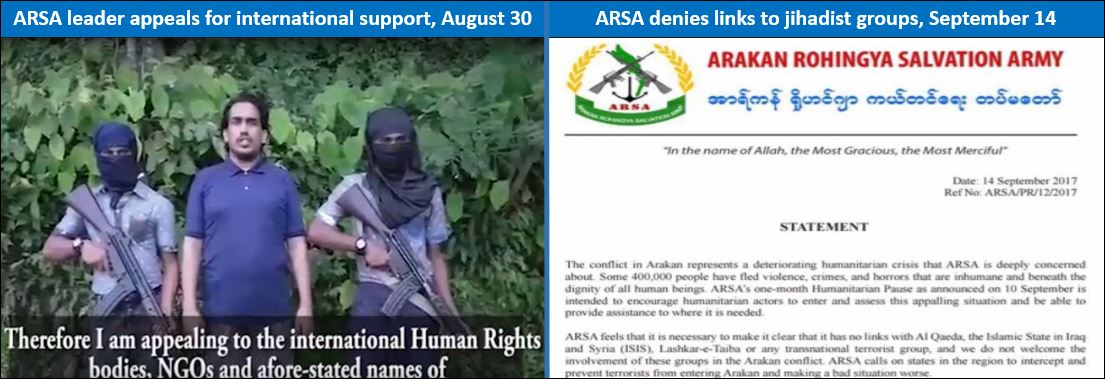Current Situation
The central leadership of al-Qaeda, a transnational jihadist group, issued a statement titled “Burma Calling” on September 12. The release urged its Muslim supporters in Bangladesh, India, Pakistan, and the Philippines to travel to Myanmar to assist Rohingya Muslim. The statement also suggested that those willing to join should seek “necessary preparations-including training and the like to resist this oppression against Rohingya Muslims”, underlining the need to resort to the use of force to secure their rights. The statement was preceded by a video message released by an Al-Qaeda-affiliated media organization on September 2, in which a senior Yemeni-based militant leader was calling for Muslims in India, Indonesia, and Malaysia to support their Rohingya brothers against the “enemies of Allah”. On September 17, a suspected al-Qaeda operative of Bangladeshi origin was arrested in Delhi, India for allegedly plotting to establish a militant cell in India’s northeastern states, located along the shared border with Myanmar.

Formerly known as the Harakah-al Yaqin (HaY), the ARSA came into relevance after launching coordinated attacks on three police outposts in October 2016. While the government has repeatedly attempted to portray ARSA as a jihadist organization, the group has rebuffed such attempts, issuing statements rejecting links to overseas militant actors, including al-Qaeda. Most recently the group released a statement in direct response to al-Qaeda on September 14.
On December 4, 2016, Malaysian Prime Minister Najib Razak held a public rally in support of the Rohingya community, alleging that the Myanmar government was conducting a “genocide” against the minority group. Following the event, a coalition of Muslim civil society groups condemned the rally, claiming that it was held by the leader to exploit the Rohingya conflict for “self-interest and political purposes”. On January 8, 2017, at least 5 immigrant workers from Myanmar were murdered following an attack by masked, sword-wielding assailants in Kuala Lumpur, in what is alleged to have been a premeditated attack.
More recently, as per September 5 reports, Indonesia’s hardline Islamic Defenders Front (FPI) called for volunteers to wage jihad in Myanmar in defense of Rohingyas amidst a series of protests surrounding the Myanmar Embassy in Jakarta. A Molotov cocktail was reportedly hurled at the installation during a protest held in Jakarta on September 3. Meanwhile, a series of similar protests were recently held in Bangladesh surrounding the Myanmar Embassy in Dhaka, as well as in Chittagong, by the hardline Hefazat-e-Islam (HeI) group, which threatened to launch a jihad against Myanmar if it does not end the persecution of Rohingya, as per September 15 reports.
Assessments & Forecast
Recent statements likely part of al-Qaeda’s attempt to improve visibility in Asia, however, some degree of cooperation with transnational groups remains likely
The intelligence agencies of several South Asian countries, including India, Bangladesh, and Myanmar, have repeatedly claimed that the ARSA maintains links to jihadist groups in the region, despite ARSA’s attempts to portray itself as having no jihadist intentions. The government’s concerns are validated by the fact that several leaders of the ARSA had received training abroad, including from the Taliban and several Pakistan-based jihadist organizations. Groups such as the Lashkar-e-Taiba (LeT) are believed to have hosted several events over past years that spotlighted the Rohingya plight, and several of its operatives are believed to have traveled to countries like Bangladesh and Thailand to gather recruits from among Rohingyas fleeing violence in Rakhine State.
The August 25 attack testified to the ARSA’s visibly improved manpower and operational capabilities. Crude bombs and guns were used in the assault, as opposed to the use of cold weapons such as swords and sticks in its initial attack a few months earlier. This points to the group’s growing militant potential and raises questions about how the actors gained access to weapons and more importantly, bomb-making expertise. As assessed, previously, the elevated levels of participation in the August 25 attack, numbering in the thousands, may lend further credence to the notion that transnational recruitment via Bangladesh-based Rohingya refugee camps may play a role in the conflict.
That being said, the ARSA does not appear to be directly affiliated to or aligned with the stated goals of transnational jihadist groups such as al-Qaeda and claim to be fighting out of desperation. Its repeated statements calling for the international community to intervene in favor of the Rohingya in Rakhine State, as well as encouraging the UN Fact-Finding Commission to come to the territory remain out of step with statements issued by global jihadist groups that have urged Muslims to disregard or be hostile toward all non-Islamic institutions like the UN. Additionally, the group’s discarding of its former Islamist name, as well as the adoption of a logo which does not have Islamist underpinnings as compared to other jihadist groups, suggests that the ARSA is currently attempting to brand itself as a militant group with a purely nationalist agenda.As such, while a degree of cooperation between the ARSA and transnational groups may exist, it appears to be minimal. It remains more likely that the recent statements issued by al-Qaeda are an attempt to boost the group’s visibility in South and Southeast Asia as means of recruiting more followers to the cause. The pan-Islamic appeal of the Rohingya conflict, featuring a non-Muslim government’s alleged persecution of Muslims, falls in line with the narrative often propagated by global jihadist groups, evidenced by Islamic State (IS) leader Abu Bakr al-Baghdadi’s citation of the persecution of Rohingyas in one of his earliest public statements issued in 2014. FORECAST: However, despite attempts by transnational jihadist actors to internationalize the Rohingya conflict to drum up support and boost recruitment, such efforts have achieved minimal gains overall, and the ARSA remains far from a sophisticated jihadist outfit. This is evident in the lack of ARSA-claimed attacks targeting civilians outside of Rakhine State, which is a common modus operandi of transnational groups such as al-Qaeda and IS in the countries where they operate.
As such, while a degree of cooperation between the ARSA and transnational groups may exist, it appears to be minimal. It remains more likely that the recent statements issued by al-Qaeda are an attempt to boost the group’s visibility in South and Southeast Asia as means of recruiting more followers to the cause. The pan-Islamic appeal of the Rohingya conflict, featuring a non-Muslim government’s alleged persecution of Muslims, falls in line with the narrative often propagated by global jihadist groups, evidenced by Islamic State (IS) leader Abu Bakr al-Baghdadi’s citation of the persecution of Rohingyas in one of his earliest public statements issued in 2014. FORECAST: However, despite attempts by transnational jihadist actors to internationalize the Rohingya conflict to drum up support and boost recruitment, such efforts have achieved minimal gains overall, and the ARSA remains far from a sophisticated jihadist outfit. This is evident in the lack of ARSA-claimed attacks targeting civilians outside of Rakhine State, which is a common modus operandi of transnational groups such as al-Qaeda and IS in the countries where they operate.
Beyond nominal support, would-be militants from abroad are unlikely able to provide meaningful militant assistance to the Rohingya cause
The ARSA’s reticence to accept help from such groups likely stem from a belief that a more direct involvement of regional jihadists in the Rakhine conflict could serve as a pretext for intensified security operations by Myanmar in the restive state, and diminish international support for the Rohingya plight. Unlike other border areas in the region and even within Myanmar, which tend to be more porous, the military maintains a highly consolidated security and intelligence apparatus that effectively deprives the Rohingya of freedom of movement and assembly.
FORECAST: This lack of freedom, coupled with a high degree of border security, which has only intensified since the recent operations have begun, are likely adequate enough measures to effectively keep would-be militants from penetrating the border. Additionally, India and Bangladesh remain aware of a potential security threat emanating from the cross-border movement of vulnerable Rohingyas and have adopted increased border security measures to mitigate the same, thereby also minimizing militant movement. In this light, the seeming lack of a viable entry point for foreign-based militants, Rohingya or otherwise, into Rakhine State may limit the ability of foreign-based jihadist actors to significantly impact the militant landscape in Rakhine State.
Myanmar assets abroad likely to face increasing threats over coming months due to emotive nature of Rohingya crisis
Rakhine State may largely be insulated from external influences but outside of Myanmar, highly critical international media coverage and the stoking of ethnic tensions over the issue by world leaders has significantly elevated the threat of attack against Myanmar’s assets abroad, including diplomatic missions, business interests, and foreign workers. For example, the plight of the Rohingya in Myanmar’s restive Rakhine State has become a highly emotive issue in Malaysia over the past months, due in no small part to Malaysian Prime Minister Najib Razak’s continued focus on the issue, frequently commenting on what he perceives as an “ethnic cleansing” of the impoverished people during large-scale rallies and official press statements. While this could be interpreted as a populist tactic meant to shift focus from internal domestic issues, the effect will likely increase the threat of attacks against the estimated 150,000 Myanmar migrant workers in the country, as was witnessed in January.
FORECAST: As the issue continues to become increasingly politicized in Malaysia, and Naypyidaw continues, as frequently indicated, to remain on its current policy course in Rakhine State, police officials in Malaysia may project a reluctance to protect Myanmar nationals or investigate future attacks, further entrenching their lack of safety and tacitly encouraging such violence. Beyond workers, threats against diplomatic missions are also becoming an increasing concern. Crude attacks on Myanmar assets have previously transpired, while more sophisticated attack plots against such installations have also been foiled, including an RSO plot to bomb the Myanmar Embassy in Jakarta in 2013, as well as similar attempts on the same installation in late 2016. The fact that a crude bomb attack was witnessed during a pro-Rohingya protest held on September 3 in Jakarta, a day after the AQAP statement, suggests that these messages do resonate with radicalized segments of society, not only from among jihadist actors but also from hardline Islamists.
FORECAST: Additionally, there also remains the threat that jihadist groups will seek to use other government’s perceived apathy regarding the Rohingyas in order to drum up support for attacks locally. The serial bombings at the Mahabodhi Buddhist temple in India in 2013 were allegedly perpetrated by al-Qaeda-affiliated groups and targeted international Buddhist tourists to avenging the killings of Rohingyas. In the long run, al-Qaeda may also seek to attract recruits from within Myanmar in order to conduct attacks outside of Rakhine State. In this context, it is notable to mention a series of crude bombings in Yangon in November 2016, which the government alleged was perpetrated ARSA sympathizers. While the low operational impact of the bombings suggested the perpetrators were either unwilling or unable to cause casualties or injuries, the timing of the attacks does seem to suggest that the bombings were retaliatory in nature and mounted in response to the security operations in Rakhine state at that time. Given the difficulty Rohingya have in leaving their insulated enclosures, this suggests that the Muslim minority outside of Rakhine State may sympathize with the Rohingya cause enough to target, or at least act to intimidate the Myanmar state. That said, being just 4 percent of the country’s total population is Muslim and the majority live in Rakhine State, the potential for recruitment remains minimal. While it remains possible that Muslims from abroad may travel to Myanmar, like the reported intention of the FPI activists, their ability or desire to actually stage attacks remains totally unproven.
Recommendations
Travel to Naypyidaw, Mandalay, and Yangon may continue at this time while adhering to basic security protocols given the latent threat of militancy and petty crime. We advise against nonessential travel to Rakhine due to the ongoing communal violence. Remain cognizant of local laws and customs, while avoiding references to Rohingya, given that even use of the term is illegal. Given the emotive nature of the issue, we advise to avoid discussing the communal violence in Rakhine State throughout South and Southeast Asia, so as to avoid complications with locals



